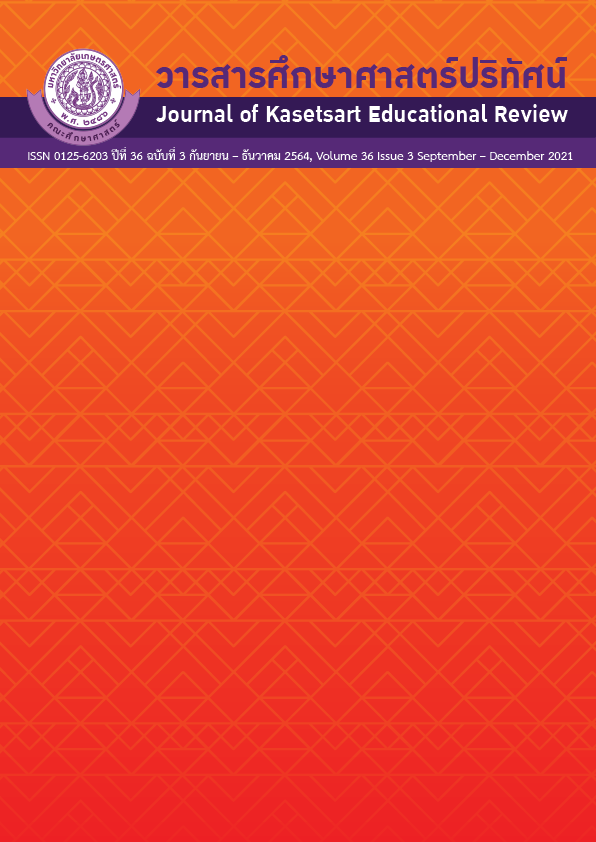ผลการจัดการเรียนรู้แบบสะตีมศึกษาที่มีต่อผลสัมฤทธิ์ทางการเรียนเรื่อง สารในชีวิตประจำวัน และความคิดสร้างสรรค์ทางวิทยาศาสตร์ สำหรับนักเรียนชั้นประถมศึกษาปีที่ 6 กลุ่มโรงเรียนปู่เจ้าสมิงพราย จังหวัดสมุทรปราการ
คำสำคัญ:
การจัดการเรียนรู้แบบสะตีมศึกษา, ผลสัมฤทธิ์ทางการเรียน, ความคิดสร้างสรรค์ทางวิทยาศาสตร๋บทคัดย่อ
การวิจัยครั้งนี้ มีวัตถุประสงค์เพื่อ 1) เปรียบเทียบผลสัมฤทธิ์ทางการเรียน รายวิชาวิทยาศาสตร์ เรื่อง สารในชีวิตประจำวัน ของนักเรียนชั้นประถมศึกษาปีที่ 6 ที่ได้รับการจัดการเรียนรู้แบบสะตีมศึกษากับเกณฑ์ร้อยละ 80 และ 2) เปรียบเทียบความคิดสร้างสรรค์ทางวิทยาศาสตร์ของนักเรียนชั้นประถมศึกษาปีที่ 6 ที่ได้รับการจัดการเรียนรู้แบบสะตีมศึกษาระหว่างก่อนเรียนและหลังเรียน
กลุ่มตัวอย่างที่ใช้ในการวิจัยครั้งนี้ ได้แก่ นักเรียนชั้นประถมศึกษาปีที่ 6 โรงเรียนวัดปุณหังสนา-วาส ซึ่งเป็นโรงเรียนในกลุ่มโรงเรียนปู่เจ้าสมิงพราย จังหวัดสมุทรปราการ ภาคเรียนที่ 2 ปีการศึกษา 2562 จำนวน 1 ห้องเรียน รวม 20 คน ได้มาจากการสุ่มแบบหลายขั้นตอน เครื่องมือที่ใช้ในการวิจัยได้แก่ 1) แผนการจัดการเรียนรู้แบบสะตีมศึกษา เรื่อง สารในชีวิตประจำวัน ระดับชั้นประถมศึกษาปีที่ 6 2) แบบทดสอบวัดผลสัมฤทธิ์ทางการเรียน เรื่อง สารในชีวิตประจำวัน และ 3) แบบทดสอบวัดความคิดสร้างสรรค์ทางวิทยาศาสตร์ สถิติที่ใช้ในการวิเคราะห์ข้อมูลได้แก่ ค่าเฉลี่ย ส่วนเบี่ยงเบนมาตรฐาน และการทดสอบค่าที
ผลการวิจัยพบว่า 1) ผลสัมฤทธิ์ทางการเรียน รายวิชาวิทยาศาสตร์ ของนักเรียนที่ได้รับการจัดการเรียนรู้แบบสะตีมศึกษามีคะแนนเฉลี่ยร้อยละ 83.33 ซึ่งผ่านเกณฑ์ร้อยละ 80 ที่กำหนดไว้อย่างมีนัยสำคัญทางสถิติที่ระดับ .05 และ 2) ความคิดสร้างสรรค์ทางวิทยาศาสตร์ของนักเรียนที่ได้รับการจัดการเรียนรู้แบบสะตีมศึกษาหลังเรียนสูงกว่าก่อนเรียน อย่างมีนัยสำคัญทางสถิติที่ระดับ .05
เอกสารอ้างอิง
Burachat, S. (2018). 2018 O-Net score Summery National Institute of Education Testing Service/http://onet/107392.html. [in Thai]
Chindanurak, T. (2014). Creative thinking development and evaluation in school. Veridian E- Journal, Silpakorn University. 9(1).560-581. [in Thai]
Chaowakeratipong, N. (2016). Science Teaching 2 . In Academic department publisher (Editor), Foundation Methodologies Unit 6-10 (pages 4-31). Nonthaburi : Department of Education Sukhothai Thammathirat Open University. [in Thai]
Fakkhaw, S. (2018). 21 st Century Skills./http://web.chandra.ac.th. [in Thai]
Faikhamta, Ch. (2018) . Science classroom culfure of Thai Students. Journal of Education. 19(1) .43-53. [in Thai]
Intavimolsri, S. (2017). Effects of Using the STEAM Education Approach in Biology on Sciectific Creativity and Learning Achievement of Tenth Grade Student. Journal of Education Studies. 47(2).410-430. [in Thai]
Institute for the Promotion of Teaching Science and Technology. (2013). http://pisathailand.ipst.ac.th. [in Thai]
Itsarasena, Na Ayuthaya, W. (2018). Interesting things about STEM (STEM Education). Bangkok : Chulalonhkorn University. [in Thai]
Jarernpit, N.(1996). Development Option Scientific Creativity in Concept and Practices. Bangkok. Duongkamon. [in Thai]
Jaitheang, A. (2003). Teaching principles. Bangkok. O.A. Printing house. [in Thai]
Johnson, D.W., and Johnson, R. (1999). Learning together and alone : Cooperative, competititive, and individualistic learning (5th Ed). Boston : Allyn & Bacon.
Kharmmanee, T. (2005). Teaching Science : Khowledge to Organiza Learning Process Performance. Bangkok. Chulalongkorn University. [in Thai]
Kootragul, S. (2017). Science Education. Bangkok Chulalongkorn University. [in Thai]
Iamsuphasit, P. (2015). Learning and Teaching. In Academic department publisher (Editor), Seminar in Science Curriculum and Lnstruction Unit1-5 (pages1-21) Nonthaburi : Department of Education Sukhothai Thammathirat Open University. [in Thai]
Land, M. H. (2013). Full STEAM ahead: The benefits of integrating the arts in to STEM. Procedia Computer Science,20,547-552.
Pattana, N & Chaowakeratipong, N & Chindanurak, T. (2019). The Effect of Learning Management Based on STEM Education Appoach on Learning Achievement in the Chemistry course Topic of Organic Chemistry and Science Creative Thinking of Matthayom Suksa VI Student at Pak Chong School in Nakhon Ratchasima Province. STOU Education Journal.12(2).118-132. [in Thai]
Papert, S. (1999) . What Is Logo? And Who Needs It. Retrieved from. http://WWW.microworlds.com/support/logo – philosophy-papert.html
Pooreeprechaleard, S. et. Al. (2019). The Development of Integrated Curriculam “DOUBLE STEAM” Enhancing Student Competencies of Lower Secondary Students. Satitpatumwan University School. Bangkok. [in Thai]
Ruechaiphanich, W. (2016). Creativity and development of Thai education./http://mcpswis.mcd.acoth/html_deulcgi_bin/mcp/main_php/prin_informe d.php?id_count_infrom=21740[2]. [in Thai]
Sinlarat, P. (2016). 21 st Century Skills must Overcome the western trap. Bangkok : Chulalongkorn University. [in Thai]
Sintoovongse ,K & Visavateeranon, S. (2017). Psychological basis of science teaching. In Academic department publisher (Editor), Foundation Methodologies Unit 6-10 (pages 5-139). Nonthaburi : Department of Education Sukhothai Thammathirat Open University. [in Thai]
Soonthornroch, W. (2006). Innovation for Learning. Mahasarakam University. Mahasarakam.
[in Thai]
Talhikorn, B. (2003). Guidelines for carrying out Teaching Acitivities (part 2). Retrieved from. http://kmutt.ac.th/organization/Education/Technology/Tech_de/constructionsm/cons tructionism. [in Thai]
Tedam, J. (2008). Integrated Science Process Training Stimulate Creative Thinking for Secondary Student Grade 2. Uttaradit Rachapat University, Uttaradit. [in Thai]
Thammaprateep, J. (2017). Sciened perception. In Academic department publisher (Editor), Foundation Methodologies Unit 1-5 (pages 4-21). Nonthaburi : Department of Education Sukhothai Thammathirat Open University. [in Thai]
Thongjun, N & Pankaew, P. (2016). Development of Creative Thinking Science of lower secondary Students Leaning Through Brain Storming. Journal of Graduate Research.7(1).1-14. [in Thai]
Wongthong, P. (2019). Effect of Integrated Learning Activities Based on STEAM Education on Science Learning Achievement, Critical Thinking Skill and Student’ Satisfaction of Grad 4 Student : Journal of Research Unit on Science, Technology and Environment for Learning. 10(1). 81-99. [in Thai]
Yang, K., Lin, S. Hong , Z and Lin, H. (2016). Exploring the assessment of and relationship between elementary student’ scientific creativity and science inquiry. Creativity Research Journal, 28(1),16-23
ดาวน์โหลด
เผยแพร่แล้ว
ฉบับ
ประเภทบทความ
สัญญาอนุญาต
ลิขสิทธิ์ (c) 2020 วารสารศึกษาศาสตร์ปริทัศน์

อนุญาตภายใต้เงื่อนไข Creative Commons Attribution-NonCommercial-NoDerivatives 4.0 International License.
บทความทุกบทความเป็นลิขสิทธิ์ของวารสารคณะศึกษาศาสตร์ มหาวิทยาลัยเกษตรศาสตร์ วิทยาเขตบางเขน
วารสารศึกษาศาสตร์ปริทัศน์ (Kasetsart Educational Review)






